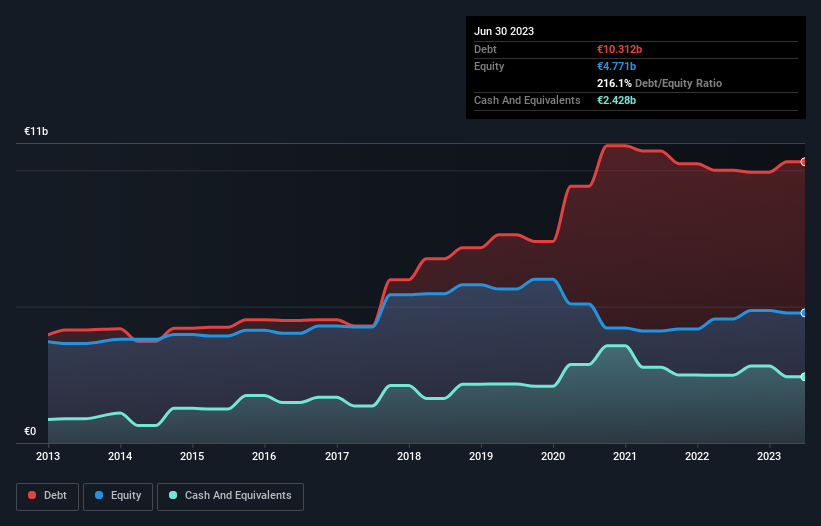
Some say volatility, rather than debt, is the best way to think about risk as an investor, but Warren Buffett famously said that 'Volatility is far from synonymous with risk.' It's only natural to consider a company's balance sheet when you examine how risky it is, since debt is often involved when a business collapses. Importantly, Aeroports de Paris SA (EPA:ADP) does carry debt. But the real question is whether this debt is making the company risky.
When Is Debt A Problem?
Generally speaking, debt only becomes a real problem when a company can't easily pay it off, either by raising capital or with its own cash flow. If things get really bad, the lenders can take control of the business. While that is not too common, we often do see indebted companies permanently diluting shareholders because lenders force them to raise capital at a distressed price. Having said that, the most common situation is where a company manages its debt reasonably well - and to its own advantage. The first step when considering a company's debt levels is to consider its cash and debt together.
See our latest analysis for Aeroports de Paris
What Is Aeroports de Paris's Net Debt?
As you can see below, Aeroports de Paris had €10.3b of debt, at June 2023, which is about the same as the year before. You can click the chart for greater detail. However, it also had €2.43b in cash, and so its net debt is €7.88b.

How Healthy Is Aeroports de Paris' Balance Sheet?
We can see from the most recent balance sheet that Aeroports de Paris had liabilities of €4.24b falling due within a year, and liabilities of €10.0b due beyond that. Offsetting these obligations, it had cash of €2.43b as well as receivables valued at €1.39b due within 12 months. So its liabilities outweigh the sum of its cash and (near-term) receivables by €10.5b.
This is a mountain of leverage even relative to its gargantuan market capitalization of €11.7b. This suggests shareholders would be heavily diluted if the company needed to shore up its balance sheet in a hurry.
We measure a company's debt load relative to its earnings power by looking at its net debt divided by its earnings before interest, tax, depreciation, and amortization (EBITDA) and by calculating how easily its earnings before interest and tax (EBIT) cover its interest expense (interest cover). This way, we consider both the absolute quantum of the debt, as well as the interest rates paid on it.
Aeroports de Paris has a debt to EBITDA ratio of 4.2 and its EBIT covered its interest expense 4.0 times. This suggests that while the debt levels are significant, we'd stop short of calling them problematic. Looking on the bright side, Aeroports de Paris boosted its EBIT by a silky 82% in the last year. Like the milk of human kindness that sort of growth increases resilience, making the company more capable of managing debt. The balance sheet is clearly the area to focus on when you are analysing debt. But ultimately the future profitability of the business will decide if Aeroports de Paris can strengthen its balance sheet over time. So if you want to see what the professionals think, you might find this free report on analyst profit forecasts to be interesting.
Finally, while the tax-man may adore accounting profits, lenders only accept cold hard cash. So the logical step is to look at the proportion of that EBIT that is matched by actual free cash flow. During the last two years, Aeroports de Paris generated free cash flow amounting to a very robust 96% of its EBIT, more than we'd expect. That puts it in a very strong position to pay down debt.
Our View
Both Aeroports de Paris's ability to to convert EBIT to free cash flow and its EBIT growth rate gave us comfort that it can handle its debt. Having said that, its net debt to EBITDA somewhat sensitizes us to potential future risks to the balance sheet. We would also note that Infrastructure industry companies like Aeroports de Paris commonly do use debt without problems. When we consider all the elements mentioned above, it seems to us that Aeroports de Paris is managing its debt quite well. Having said that, the load is sufficiently heavy that we would recommend any shareholders keep a close eye on it. The balance sheet is clearly the area to focus on when you are analysing debt. However, not all investment risk resides within the balance sheet - far from it. Case in point: We've spotted 3 warning signs for Aeroports de Paris you should be aware of, and 1 of them is concerning.
At the end of the day, it's often better to focus on companies that are free from net debt. You can access our special list of such companies (all with a track record of profit growth). It's free.
New: Manage All Your Stock Portfolios in One Place
We've created the ultimate portfolio companion for stock investors, and it's free.
• Connect an unlimited number of Portfolios and see your total in one currency
• Be alerted to new Warning Signs or Risks via email or mobile
• Track the Fair Value of your stocks
Have feedback on this article? Concerned about the content? Get in touch with us directly. Alternatively, email editorial-team (at) simplywallst.com.
This article by Simply Wall St is general in nature. We provide commentary based on historical data and analyst forecasts only using an unbiased methodology and our articles are not intended to be financial advice. It does not constitute a recommendation to buy or sell any stock, and does not take account of your objectives, or your financial situation. We aim to bring you long-term focused analysis driven by fundamental data. Note that our analysis may not factor in the latest price-sensitive company announcements or qualitative material. Simply Wall St has no position in any stocks mentioned.
About ENXTPA:ADP
Solid track record, good value and pays a dividend.


